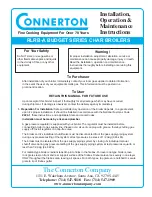
Green Heating Technology
40
Signal
Probable causes
Suggested solutions
02
the boiler has over
-
heated and the
Safety Thermostat
has triggered
Turn the knob on the unlock
position until the red lamp
turns off (or eventually for a longer period to make the boiler cool),
then bring the knob in the previous position. If necessary, wait and
try again for few times. If the lockout persists or reappears, call the
Service Centre.
Verify the safety thermostat functionality. Detect the causes of
the overheating, e.g. an insufficient circulation in the primary cir-
cuit; max gas pressure out of the limits or maximum heating power
excessive for the heating system size.
03
The overheat ther
-
mal fuse of the
combustion assem-
bly has triggered
(combustion assem-
bly overheating)
Solve the problem that caused the overheating, then replace the
combustion assembly.
Note for the TECHNICIAN: the condensing combustion assembly has overheated
and the relevant thermal fuse has blown. This is an extreme protection that
normally is anticipated by other safety thermostats. If, in case of fault, those
devices should not trigger and the burner should get hotter and hotter, the
thermal fuse will cause the block of the boiler to avoid damages to building and
furniture, but the combustion group must be considered damaged and there
-
fore it must be replaced
.
The flue overheat
thermal fuse has
triggered (flue on
boiler outlet too
hot)
Solve the problem that caused the overheating of the flue, then
replace the flue thermal fuse.
Note for the TECHNICIAN:
the
flue thermal fuse preserves the flue ducts (that are
made with Polypropylene, a material suitable to the condensate acidity) from
the high temperatures, that could lead to their fusion or deformation. The trig
-
gering of this device consists in its blowing and therefore it must be replaced.
– 5
Communication be-
tween display and
main PCB is not cor
-
rect
At every Power On, this alarm is showed for max 2-3 seconds; then
it will disappear. If not, call the Service.
Check display, main PCB and connection wire. Replace what it is
needed.
05
Failure to the sys
-
tem flow tempera-
ture probe.
Check the cabling of the system flow temperature probe (primary
circuit).
Replacement of the system flow temperature probe.
10
Insufficient system
pressure
(loss of water pressure
switch triggered)
Restore the correct pressure as described in "Preliminary opera
-
tions" on page 9 or (preferibly bu the Technician) in "System filling
and pressuring" on page 19.
Remark: Consider that the pressure, in normal conditions, should not decrease with the progress of the time. If
this happens, there is probably a loss in the heating system. Sometimes the loss is so small that it doesn’t
leave evident signs, but with the progress of the time it can cause the decreasing of the pressure. Also the
opening of the manual venting taps of radiators (intentional or unintentional) makes the pressure decrease.
Check that this doesn’t happen.
12
Failure to the DHW
storage tempera
-
ture probe.
Check the cabling of the DHW storage temperature probe.
Replacement of the DHW storage temperature probe.
15
Failure to the heat
-
ing system return
temperature probe.
Check the cabling of the system return temperature probe.
Replacement of the system return temperature probe.
















































